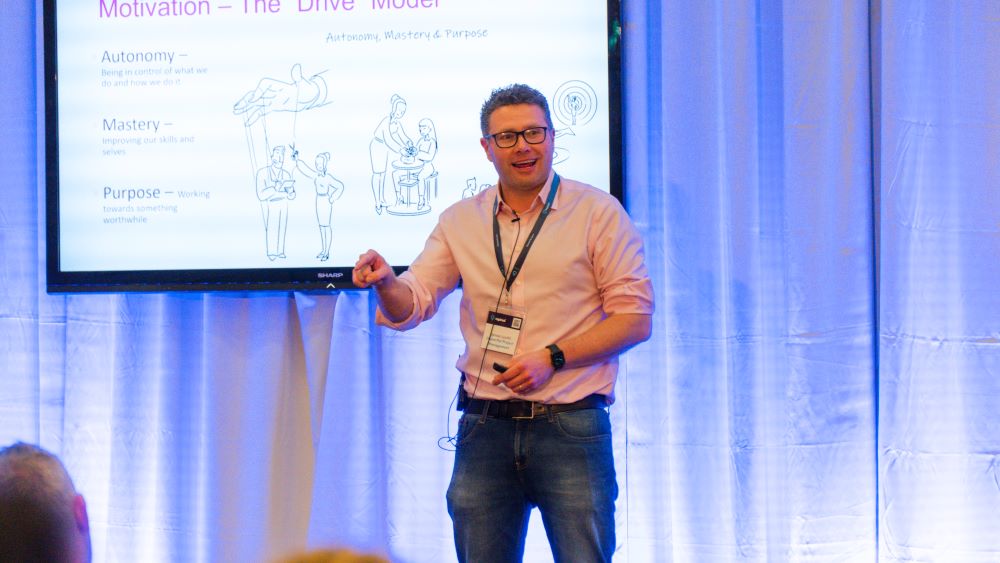Podcast 219: Want to lead successful, effective teams? James Louttit has survived burnout to become one of Ireland’s leading project management experts.
Whatever you do, whether you realise it or not, you are a project manager. Whether you work in finance, marketing, technology, sales, law, you name it, the common denominator in most organisations in the third decade of the 21st century is we are all project managers. It’s just not in all of our job titles.
On a mission to empower project managers everywhere James Louttit, author of a new book How To Lead Impactful Teams, knows a thing or two about stress and exhaustion. He survived actual burnout and has processed the experience in such a way as to build a successful consulting business, Impactful PM.
“Leadership is not about telling people what to do, it comes from making sure that there’s a clear direction that has come from everybody, ensuring everyone has had an input into it. And then listening over and over again”
In 2023 he was awarded Project Management Professional of the Year by the Ireland Chapter of the Project Management Institute (PMI).
His book is a powerful read for anyone involved in project management, be it in work or outside of it. The book is practical and refreshing and helps managers and their teams deliver greater project outcomes with minimal stress, maximum fun.
Prioritisation is the backbone of value and effort
I spoke to James for the first time just last year. A former chief information officer at international recruitment agency CPL as well as holding senior roles at Accenture, Louttit suffered from burnout a few years ago that resulted in him becoming quite ill and being hospitalised.
This experience led to him seeking out a better way to work and live and has inspired his career ever since.
I point out to him that most people, myself included, battle feelings of being overwhelmed when juggling the pressures of life and work. The distractions of the modern world, instant communication, measuring against others on social media and more, mean the calmness and clarity required to be effective often suffer.
“Much of what I talk in the book is about prioritisation. That for me is the fundamental, biggest thing, that everybody needs to focus on.
“I’ve had a lot of benefit from focusing on high value, low effort things. If you’re looking at your time through a lens, whether its work or its life, there is an infinite amount of work and there’ an infinite amount of stuff that we do. So you can be as busy as you want.”
In his own life he’s come up with too many ideas and trying to execute them all means priorities get ignored for those ideas. “You need to focus on those priorities because at the end of the day that’s what you’re paid for. Even just write a list of what you think is the most important priority in terms of first, second third and fourth and so on, and put an estimate in terms of each thing you are doing, it becomes apparent that you can’t fit everything in.
“If you know you can do the first four things but can’t get to the sixth or seventh, then you delegate, escalate or outsource or just send someone an email saying ‘sorry’ or whatever. But instead of being dropped balls, they are active decisions that get made on the prioritisation. And I think that is much better both as a personal approach and really for business and projects as well.”
Effective leadership, Louttit, explains, is more complicated, but it’s about involving people and listening.
“Leadership is not about telling people what to do, it comes from making sure that there’s a clear direction that has come from everybody, ensuring everyone has had an input into it. And then listening over and over again. Leadership is 1,000 tiny little things, it’s not one big thing. It’s also about making mistakes, learning from those and doing things slightly different in ways that have a bigger impact next time.”
For people who are dealing with large workloads, Louttit urges frank conversations with stakeholders and managers. “If you can force a bit of prioritisation into the conversation, you can reduce the amount of work that’s on your plate.”
Successful project management comes down to managers getting the best out of themselves and their colleagues.
“It’s about making sure that you’re working on the right things: high value, low effort things. When you are working on these things then all of a sudden all of the resources are available to you because the thing you are working on is valuable to the people who want it.”
This, he says, boils down to control and balance.
When he wrote the book, Louttit said he was addressing business owners, senior executives, project managers and their teams.
Stress and overload creep into workplaces when the environment isn’t right and prioritisation hasn’t been addressed. The challenge is steering everyone in the right direction and making sure everyone feels heard.
The book is full of methodologies and techniques for keeping everyone focused on the top goals.
“It is tiny little behavioural changes that can make enormous differences to the culture of an organisation.”
-
Bank of Ireland is welcoming new customers every day – funding investments, working capital and expansions across multiple sectors. To learn more, click here
-
Listen to the ThinkBusiness Podcast for business insights and inspiration. All episodes are here. You can also listen to the Podcast on:
-
Spotify
-
SoundCloud
-
Apple





